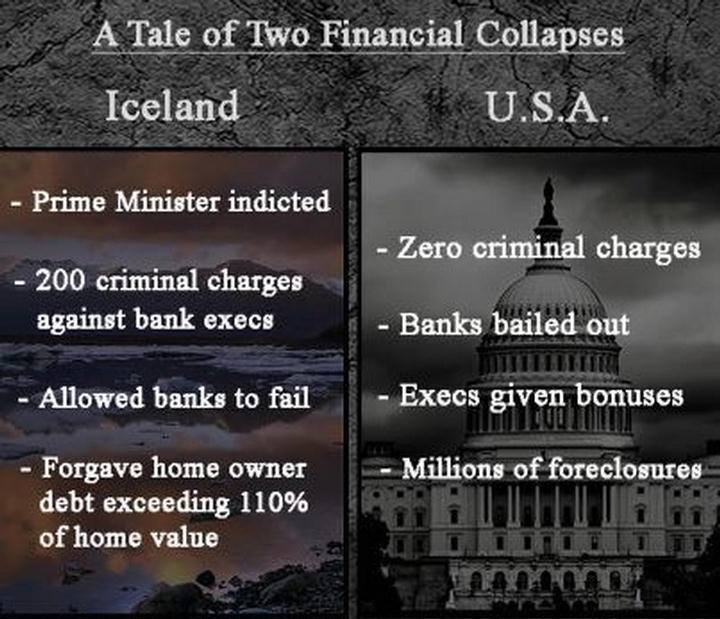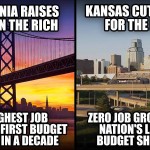Here we have another economic meme, somewhat similar to the meme I examined recently and accused of being BS.*
- It’s comparing two disparate regions, Iceland and the United States.
- It’s discussing economic actions and results.
- It’s trying to make an implicit point.
So what is it claiming?
Both Iceland and the United States suffered financial collapses. I don’t follow the news from Iceland, but I’ll take it as read that Iceland has indeed had difficulties. The events here in the United States I remember quite well.
In Iceland, we learn,
- The Prime Minister was indicted. I gather there was some reason to think he was responsible. Was he convicted?
- Bank executives were charged with crimes. Two-hundred charges were made; how many were brought to trial? How many were convicted?
- Banks were allowed to fail. OK.
- Mortgagees were forgiven debt in significant excess of the value of their homes. But by who? The government? The banks? Both? More importantly, how many home owners were in this position, and what was the total debt that was forgiven?
For the purposes of analysis, I’ll assume that these assertions about Iceland are true and not misleading.
In the United States, we had a scheme where the U.S. government was seeking equality of outcome by encouraging banks, through FNMA, to give inexpensive, dangerously structured loans to first-time buyers without due concern for their ability to repay—a classic example of seeking short-term gains at the expense of long-term viability. When the collapse came, according to this meme,
- No one was charged. I think this is a slight exaggeration; there were a few lawsuits that were at least tangentially involved. (I’m thinking of Countrywide Funding here.) But in general, this is true.
- Banks were bailed out. They certainly weren’t allowed to fail.
- Execs given bonuses. Perhaps they were; it wouldn’t surprise me. Execs of large corporations are always given bonuses. I find it interesting that all of the blame seems to be put on the bankers; in fact, the government was in it with both feet and a shovel.
- Millions of homes were foreclosed on. Well, yes; that’s what happens when you give home loans without due regard for risk. I’d be curious to know what the total unpaid debt has been.
Now for the implicit claims, which are much more modest, I think, than in that other meme.
The responsible parties in the U.S. collapse should have been held accountable; they were in Iceland. So it seems, and we agree.
The responsible parties in the U.S. collapse could have been held accountable. I’d certainly like to think so. But given the degree of cooperation between the government and the banking industry, it wasn’t likely. This wasn’t a matter of one or two individuals agreeing to do the dirty; it was the result of a major policy decision that impacted many, many workers on both sides. In America, we far too often reward failed policies by re-doubling our efforts in the same direction.
And then here’s the kicker:
Foreclosures were avoided in Iceland; maybe those millions of foreclosures could have been avoided. The best way to have avoided them would have been to have not made the loans to begin with. But given that we did, could we have forgiven the excess debt?
The first thing to note, here, is that the sums of money involved in Iceland were necessarily much, much lower than here in the United States. One of the commenters on this meme on Facebook noted that she lived in a U.S. county with twice the population of Iceland. That means that the issues were combinatorially simpler, easier to understand, easier to manage, and (apparently) easier to solve.
Were the loans in Iceland held by the individual banks? In the United States, these kinds of loans are generally repackaged and sold to investors as junk bonds. The banks don’t own them, they just service them; and when a mortgagee can’t pay, it isn’t the bank that suffers, but the investors who were foolish enough to invest in junk bonds. And many of those investors were probably mutual funds representing many small investors.
Forgiving all of that debt would have helped the home owners but would have adversely impacted many other everyday Americans, many of whom were in no way responsible. It was a difficult situation.
To conclude, there’s much to criticize on this meme; but on reflection I find it much less guilty of indulging in BS than its predecessor.
- It’s much more muted, using quiet colors and a less strident font. It doesn’t appear to be going for emotional effect.
- It seems directed toward spurring reflection rather than reaction.
- It encourages responsibility and accountability, which I’m certainly in favor of.
- It encourages the reader to assume that two disparate situations are directly comparable when a moment’s reflection shows that they can’t be.
- It takes an overly simplistic view of the nature of the collapse here in the United States. But then, it’s a meme.
In short, it’s pointing out a real problem with how we handled home loans in past decades, and encouraging us to do better in the future, rather than manipulating us to jump to conclusions to support a particular taxation policy. There’s maybe a slight whiff of BS here, but it isn’t overpowering;** I’d be much more likely to accuse it of wishful thinking.
_____
* I’ll use this abbreviation out of deference to the reader who assumed I was using bad language to try to be edgy and such. A casual glance at my previous posts will reveal that I’m not inclined to do that.
** Always assuming that the statements about Iceland are true and not misleading.












